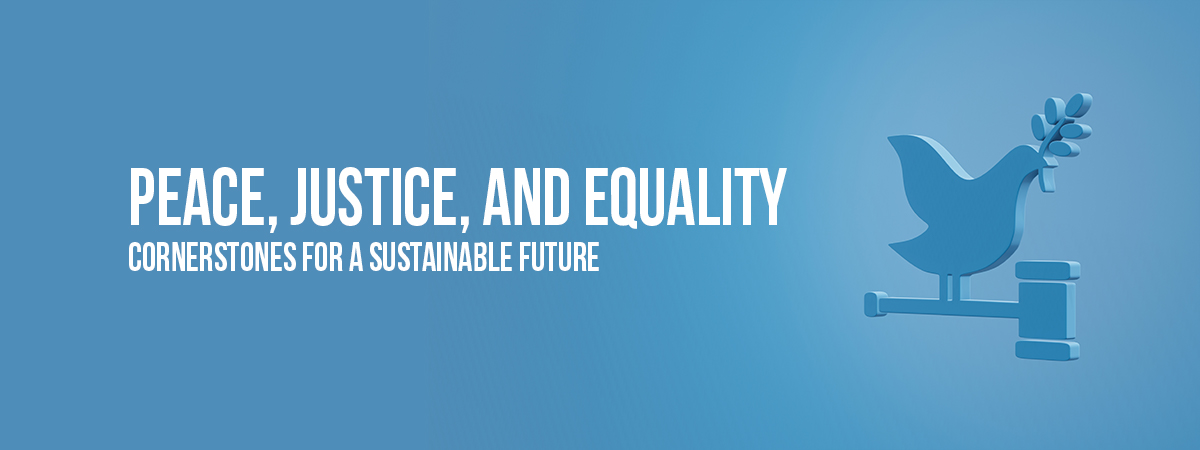
In 2019, the World Economic Forum commissioned a poll on the United Nations’ Sustainable Development Goals. The survey found that the goals dealing with hunger, clean water, good health, affordable and clean energy, and the world’s oceans earned top billing. Things such as reducing inequalities and peace, justice, and strong institutions ranked near the bottom.
But ask Mary Frank Fox or Michael Best, two Ivan Allen College professors who research gender equality issues — and in Best’s case, issues related to peace and strong institutions — and you’ll hear a much broader story.
“Good governance and peace are extremely critical. We’ll never have a clean environment if we don’t have peace and good governance,” said Best, a former UN official who has joint appointments in the Sam Nunn School of International Affairs and the College of Computing.
And gender equality?
“Gender equity is central to every sustainability goal,” said Fox, ADVANCE Professor in the School of Public Policy. “It supports economic development. It supports political engagement. It supports the health and wellness and welfare of communities.”
Best and Fox are just two of the many Ivan Allen College faculty members who work on issues related to gender equality (SDG 5), reduced inequalities (SDG 10), and peace, justice, and strong institutions (SDG 16).
“A Robust Partnership”: Humanities, Social Sciences, Science, and Technology

These goals don’t always get the spotlight. Still, they are part of an interdependent series of targets, approved by UN member states in 2015, that now serve as a guide for Georgia Tech as we pursue our mission of developing leaders who advance technology and improve the human condition. The latter is a significant focus of the Ivan Allen College of Liberal Arts. After all, the institution is named after transformational Civil Rights-era Atlanta Mayor Ivan Allen Jr. and has human-centered inquiry and social justice baked into its organizational DNA.
“The best way for Georgia Tech to be truly impactful on the grand global challenges described within the SDGs is when it is a robust partnership between Ivan Allen College and the science and technology side of campus,” said Best. “The focus just on the technology is a guarantee that there will be inadequate responses to these global challenges due to a misunderstanding of the broader contexts, the politics, the cultures, the social issues, the economic issues.”
An excellent example of this blend of technological and humanistic approaches is the Digital Threats to Democracy project in Best’s Technologies and International Development Lab.
Best returned to Georgia Tech in 2015 after helping found the United Nations University Institute on Computing and Society in Macau. Since then, his lab has partnered with the Carter Center in Atlanta to work on a long-term project focused on “inventing new software platforms and real-world processes to help identify, track, and respond to digital threats to democratic development.”
In 2020, the group, comprised of students from the College of Computing and the Nunn School, worked with NGOs in Myanmar to identify hate speech and threats to the country’s election. This year, they are working in conflict-stressed Ethiopia.
The best way for Georgia Tech to be truly impactful on the grand global challenges described within the SDGs is when it is a robust partnership between Ivan Allen College and the science and technology side of campus.
— Michael Best, Nunn School of International Affairs
Best and his students work with a Georgia Tech-grown software platform called Aggie that uses natural language process and machine learning to help in-country partners zoom in on hate speech and disinformation and take steps to protect fragile democracies.
While the technology is impressive, it really is secondary, said Best.
“The end goal is not to build a social media tracking platform. The goal is to impact the development of democracy in Myanmar positively and ultimately to benefit all people in that society. So, it doesn’t matter if you get the technology right if, two months later, the military takes over, as happened in Myanmar. Then you know you’ve missed, in this case, the political and social dynamics that rule the world and certainly ruled this instance.”
Rana Shabb, a Ph.D. candidate in the Nunn School, approaches SDG 16 from a different angle: finding ways to bring business into the work of supporting peace.
“Civil war is the opposite of progress and development, is immensely destructive to all elements of human life, and tends to be a trap,” Shabb said. “Once a country has experienced civil war, it is more likely than other places to relapse into violence and destruction. As such, my research focuses on finding ways to sustain peace in these fragile environments. Specifically, my work seeks to understand better how and when the private sector can support peace and which policy tools can be leveraged to support businesses that have a higher propensity for the peaceful resolution of conflict.”
Predicting Violence
Another project that focuses on social media and machine learning comes from David Muchlinksi, Best’s colleague in the Nunn School.
Muchlinski, an assistant professor, is at the forefront of work trying to improve machine learning’s ability to predict outbreaks of civil violence. In 2016, Muchlinksi authored an influential paper that helped lay the groundwork for advances in the field. He found that the machine learning algorithms he used were better at predicting civil wars than other available methods, such as traditional regression models.
“Fundamentally, I hope this work changes the world for the better,” he told Ivan Allen College for a feature last year. “I hope it allows us to understand on a deeper level what is going on with our societies, why these problems are occurring, and how we might design strategies to fix some of these problems. I hope that in being able to see a hazy version of the future, we can take steps in the present to make that future one we all want to live in.”
Gender Equality and the Realization of Talent
That approach — making a world we all want to live in — is also central to the work of Mary Frank Fox, whose career has focused on the role of gender in academics and STEM fields.
Her recent study, with Monica Gaughan of Arizona State University, examines the impact of taking family leave on tenure and promotion. They found that while the decision to take family leave had no discernible gender-based implications for the timing of tenure, it did have a significant impact on a woman’s odds of promotion to full professor. That step is a crucial career milestone that brings higher pay and more influence, Fox notes.
“This is about the realization of talent. It is about the realization of potential for everyone. Because if you don’t address equity for all, everyone loses,” Fox said.
Fox said she has seen some improvements in gender equity in STEM fields and academia but said much more work remains.
“We are getting ahead in the awarding of degrees,” said Fox. “And it’s indispensable that the opportunity for education and training has broadened and that opportunity in the entry-level positions has increased. The upper stages of the career need attention, and this calls for a life-course perspective.”
The Science of Broadening Participation
Best, the Nunn School professor, has also extensively studied gender equality in STEM fields. He is the co-founder of EQUALS global partnership, which in 2019, issued a report called Taking Stock: Data and Evidence on Gender Equality in Digital Access, Skills, and Leadership.
The report found that gender gaps remain in most information and communications technology fields, that most approaches to gender equality frame the issue in binary terms, and that no one strategy will work to eliminate gender inequalities.
Diversity in STEM education and the STEM workforce is also an issue championed by Ivan Allen College Dean Kaye Husbands Fealing.
Husbands Fealing is a member of the National Science Foundation’s Committee on Equal Opportunities in Science and Engineering and has conducted award-winning research on the gender gap in federal science agencies. Her study found that the reasons for gender pay gaps at U.S. federal science agencies differed, with men being paid more than women at agencies focused on traditionally more masculine fields such as engineering and physical sciences. Pay gaps at more gender-neutral agencies — those focused on life sciences and interdisciplinary sciences — were due to the agencies systemically hiring more women than men for low-paying jobs.
Whether you are interested in studying how literature, history, economics, or policy analysis contribute to social justice or learning how to use machine learning to help protect peace and fragile democracies, there is a place for you to develop these skills and ultimately make a difference, in the Ivan Allen College.
– Dean Kaye Husbands Fealing
She is now working on an invited paper on gender and innovation with a colleague at Stanford University. Their approach looks at underlying data and statistics that show divergent outcomes in innovation when gender is taken into account.
In addition to that work, Husbands Fealing also has a $223,000 grant to perform the first comprehensive study of a program to increase diversity among doctoral students in STEM fields. She also organized a 2016 NSF symposium on the “science of broadening participation” and has written several other papers on the topic.
“Ensuring that groups underrepresented in STEM education and jobs gain equitable access to opportunities is foundational to a sustainable future,” Husbands Fealing said.
‘What Could Be More Important Than Peace?’
Another faculty member with peace, justice, and equality on her mind is Anna Stenport. As founding co-director of the Atlanta Global Studies Center, which includes Ivan Allen College’s School of Modern Languages, Stenport and her colleagues have been pursuing a proposed peace studies ecosystem in Atlanta. The proposed network would span schools and disciplines such as engineering, health sciences, humanities, and social sciences. It is one of several initiatives of the AGSC that deal with sustainable development goals, including work on education, the environment, and other issues, many of which were discussed during the just-completed Atlanta Global Studies Symposium.
“What could be more important than peace?” Stenport said after a November webinar to discuss progress on the proposal by the Atlanta Peace Initiative. “And the notion of mobilizing the higher education sector in peacemaking, peacebuilding, and peace education is such an incredible opportunity.”
One concrete example in this area is a Vertically Integrated Project whose students connect with the idea of peace as part of their work to understand Atlanta as an increasingly global metropolis.
Opportunities for Students Abound

When it comes to Ivan Allen College faculty working in this vital area, the list could go on. For instance, social justice is another crucial area of inquiry in the Ivan Allen College. The School of History and Sociology and the School of Literature, Media, and Communication offer a joint minor in Social Justice. Social justice is also one of six threads undergraduate students can pursue as part of the Bachelor of Science in LMC.
Students can also pursue a minor in Women, Science, and Technology. This minor helps students understand “the human side of science and engineering involving not only gender issues but inequalities of race and class as well.”
LMC’s Science Fiction Studies minor also includes a robust social justice perspective.
It all adds up to tremendous opportunities for students interested in developing the skills necessary to help create a more just and sustainable future, said Husbands Fealing.
“Whether you are interested in studying how literature, history, economics, or policy analysis contribute to social justice or learning how to use machine learning to help protect peace and fragile democracies, there is a place for you to develop these skills and ultimately make a difference, in the Ivan Allen College,” said Husbands Fealing.
